语言学论文
英语语言学论文(优秀9篇)
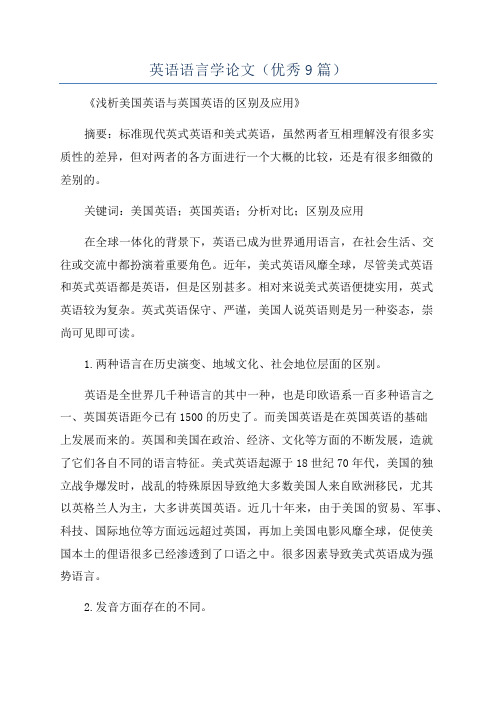
英语语言学论文(优秀9篇)《浅析美国英语与英国英语的区别及应用》摘要:标准现代英式英语和美式英语,虽然两者互相理解没有很多实质性的差异,但对两者的各方面进行一个大概的比较,还是有很多细微的差别的。
关键词:美国英语;英国英语;分析对比;区别及应用在全球一体化的背景下,英语已成为世界通用语言,在社会生活、交往或交流中都扮演着重要角色。
近年,美式英语风靡全球,尽管美式英语和英式英语都是英语,但是区别甚多。
相对来说美式英语便捷实用,英式英语较为复杂。
英式英语保守、严谨,美国人说英语则是另一种姿态,崇尚可见即可读。
1.两种语言在历史演变、地域文化、社会地位层面的区别。
英语是全世界几千种语言的其中一种,也是印欧语系一百多种语言之一、英国英语距今已有1500的历史了。
而美国英语是在英国英语的基础上发展而来的。
英国和美国在政治、经济、文化等方面的不断发展,造就了它们各自不同的语言特征。
美式英语起源于18世纪70年代,美国的独立战争爆发时,战乱的特殊原因导致绝大多数美国人来自欧洲移民,尤其以英格兰人为主,大多讲英国英语。
近几十年来,由于美国的贸易、军事、科技、国际地位等方面远远超过英国,再加上美国电影风靡全球,促使美国本土的俚语很多已经渗透到了口语之中。
很多因素导致美式英语成为强势语言。
2.发音方面存在的不同。
英语和美语的发音最具代表性的区别是对er的发音的不同。
英语中,短音的er是的浑元音,但长音的er是个拉长了的浑元音,听起来是一个介于“俄”和“啊”的声音。
而美语中,er听起来怎么都是个“儿”音。
ar:除了轻读短音(如singular)和者后连元音(如clarity),英语的ar全部清一色的长音[a:],而美语中,是“阿尔”。
英语和美语的辅音基本是一致的,但在使用习惯上也有些差别。
如词组clear animosity,英语会读成clear,animosity,而美语会读成clear—ranimosity。
另一个比较明显的区别是d和t。
英语语言学论文六篇
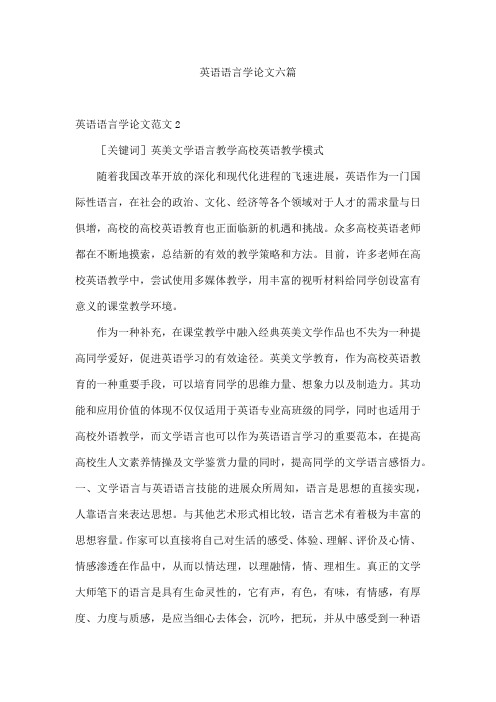
英语语言学论文六篇英语语言学论文范文2[关键词]英美文学语言教学高校英语教学模式随着我国改革开放的深化和现代化进程的飞速进展,英语作为一门国际性语言,在社会的政治、文化、经济等各个领域对于人才的需求量与日俱增,高校的高校英语教育也正面临新的机遇和挑战。
众多高校英语老师都在不断地摸索,总结新的有效的教学策略和方法。
目前,许多老师在高校英语教学中,尝试使用多媒体教学,用丰富的视听材料给同学创设富有意义的课堂教学环境。
作为一种补充,在课堂教学中融入经典英美文学作品也不失为一种提高同学爱好,促进英语学习的有效途径。
英美文学教育,作为高校英语教育的一种重要手段,可以培育同学的思维力量、想象力以及制造力。
其功能和应用价值的体现不仅仅适用于英语专业高班级的同学,同时也适用于高校外语教学,而文学语言也可以作为英语语言学习的重要范本,在提高高校生人文素养情操及文学鉴赏力量的同时,提高同学的文学语言感悟力。
一、文学语言与英语语言技能的进展众所周知,语言是思想的直接实现,人靠语言来表达思想。
与其他艺术形式相比较,语言艺术有着极为丰富的思想容量。
作家可以直接将自己对生活的感受、体验、理解、评价及心情、情感渗透在作品中,从而以情达理,以理融情,情、理相生。
真正的文学大师笔下的语言是具有生命灵性的,它有声,有色,有味,有情感,有厚度、力度与质感,是应当细心去体会,沉吟,把玩,并从中感受到一种语言的趣味性。
因此语言的背后是人的心灵世界。
对文学语言美的敏感与驾驭力量,是提高人的精神境界,使人变得更加美妙的不行或缺的方面。
文学阅读的魅力与意义也就在于此。
目前的高校英语教学,仍旧停留在传统的单纯课文教学,语言点讲解等层面上,课本内容相对陈旧,老师的教学手段也并无创新之处。
其弊端是忽视英语的基本功能即表达功能,也忽视了同学在教学活动中的主体作用,另外还忽视了对同学英语学习爱好的培育,将生硬的课本内容强行“灌输”;至同学脑海中,使整个课堂教学环节缺乏生气,长此以往,高校英语教学将陷入僵局。
语言学专业毕业论文 认知语篇分析的文化语言学视角
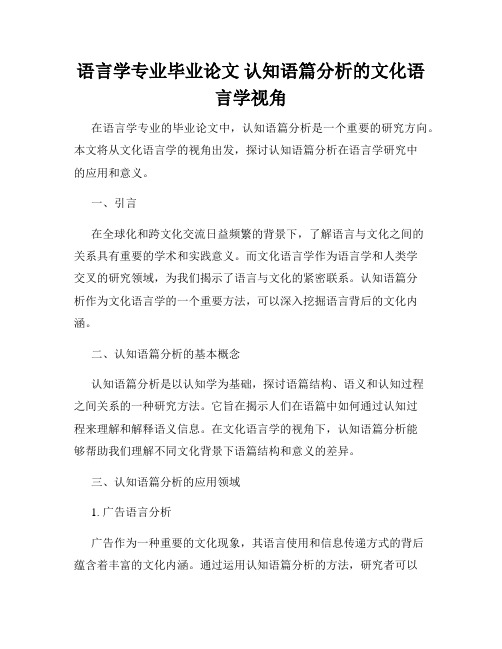
语言学专业毕业论文认知语篇分析的文化语言学视角在语言学专业的毕业论文中,认知语篇分析是一个重要的研究方向。
本文将从文化语言学的视角出发,探讨认知语篇分析在语言学研究中的应用和意义。
一、引言在全球化和跨文化交流日益频繁的背景下,了解语言与文化之间的关系具有重要的学术和实践意义。
而文化语言学作为语言学和人类学交叉的研究领域,为我们揭示了语言与文化的紧密联系。
认知语篇分析作为文化语言学的一个重要方法,可以深入挖掘语言背后的文化内涵。
二、认知语篇分析的基本概念认知语篇分析是以认知学为基础,探讨语篇结构、语义和认知过程之间关系的一种研究方法。
它旨在揭示人们在语篇中如何通过认知过程来理解和解释语义信息。
在文化语言学的视角下,认知语篇分析能够帮助我们理解不同文化背景下语篇结构和意义的差异。
三、认知语篇分析的应用领域1. 广告语言分析广告作为一种重要的文化现象,其语言使用和信息传递方式的背后蕴含着丰富的文化内涵。
通过运用认知语篇分析的方法,研究者可以深入挖掘广告语言中的文化符号和隐喻,揭示广告所传达的文化价值观和观念。
2. 新闻报道分析新闻报道作为一种日常的信息传递方式,其语言使用也受到文化因素的影响。
通过认知语篇分析,可以研究不同文化背景下的新闻报道的语义信息,揭示其中的文化隐喻和价值观。
3. 语言教学与学习在语言教学与学习中,了解不同文化背景下语篇结构和理解方式的差异对于提高语言学习者的语言能力具有重要意义。
通过运用认知语篇分析的方法,可以帮助教师和学生更好地理解语篇结构和意义,提高语言学习效果。
四、认知语篇分析的研究案例1. 高、低语境文化下的广告隐喻分析通过对高、低语境文化下广告隐喻的分析,我们可以发现不同文化之间的广告隐喻使用差异,进一步理解不同文化中的观念和价值观。
2. 新闻报道中的社会角色刻画研究新闻报道中的社会角色刻画可以揭示不同文化中对社会角色的认知差异,从而帮助我们更好地理解不同文化背景下的新闻报道。
语言学论文

语言学论文引言语言学是一门研究人类语言系统及其规律的学科。
它涉及了语音学、语法学、语义学、语用学等各个方面的研究。
本论文旨在探讨语言学的基本概念、发展历程以及其在语言教学中的应用。
1. 语言学的基本概念1.1 语言学的定义语言学是指对语言进行研究的学科,它不仅包括对语言的结构、语音和语法等方面的研究,还涉及了语言发展、语言变异以及语言间的关系等问题。
1.2 语言学的分类根据研究的内容和方法,语言学可以分为多个子学科。
其中,语音学研究语音的产生、传播和接收过程;语法学研究句子的结构和构成要素之间的关系;语义学研究词义和句子意义的生成和理解规律;语用学研究语言在社交交际中的使用。
2. 语言学的发展历程语言学的研究可以追溯到古代,但作为一门独立的学科,它的发展起源于19世纪。
20世纪以来,语言学在理论和方法上有了长足的进步,出现了多个流派和学派。
2.1 结构主义语言学结构主义语言学是20世纪初期的一种主导流派。
它通过分析语言的内部结构和音素、词汇、句法等元素之间的关系来揭示语言的规律。
2.2 生成语法学生成语法学强调语言的生成过程,认为句子是通过一定的规则和原则从基本句法元素生成的。
这种方法启发了计算机科学家发展自然语言处理的技术。
2.3 语用学的兴起语用学的兴起使得语言研究不再局限于语言的结构,而是将语言与社会交际和语境结合起来考虑。
语用学的成果为实际语言应用领域带来了重要的启示。
3. 语言学在语言教学中的应用语言学的研究成果在语言教学中起到了重要的指导作用。
语言教学注重培养学习者的语言能力和交际能力,而语言学为教师提供了有关语法、词汇、语音等方面的理论知识和实践经验。
3.1 语音教学语言学对语音的研究使得语音教学更加科学和系统化。
教师可以根据语音学的知识教导学生正确的语音发音和口腔运动。
3.2 语法教学语法是语言的骨架,语言学的研究为语法教学提供了理论基础。
教师可以借助语法学的知识帮助学生掌握词类、句法结构、句子联接等语法知识。
语言学专业毕业论文 系统功能语言学及物性理论发展综述
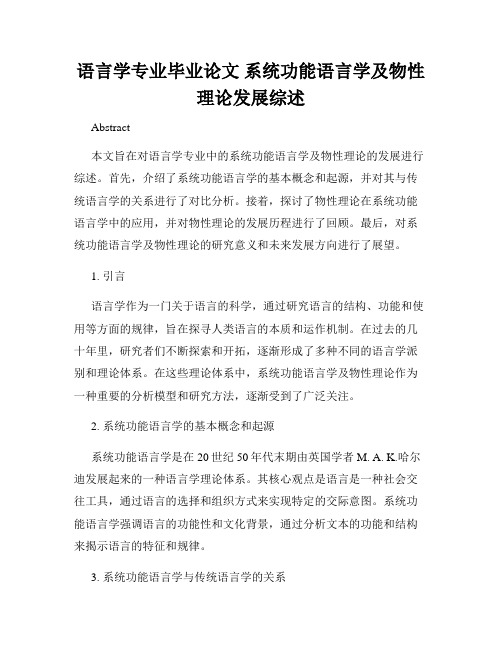
语言学专业毕业论文系统功能语言学及物性理论发展综述Abstract本文旨在对语言学专业中的系统功能语言学及物性理论的发展进行综述。
首先,介绍了系统功能语言学的基本概念和起源,并对其与传统语言学的关系进行了对比分析。
接着,探讨了物性理论在系统功能语言学中的应用,并对物性理论的发展历程进行了回顾。
最后,对系统功能语言学及物性理论的研究意义和未来发展方向进行了展望。
1. 引言语言学作为一门关于语言的科学,通过研究语言的结构、功能和使用等方面的规律,旨在探寻人类语言的本质和运作机制。
在过去的几十年里,研究者们不断探索和开拓,逐渐形成了多种不同的语言学派别和理论体系。
在这些理论体系中,系统功能语言学及物性理论作为一种重要的分析模型和研究方法,逐渐受到了广泛关注。
2. 系统功能语言学的基本概念和起源系统功能语言学是在20世纪50年代末期由英国学者M. A. K.哈尔迪发展起来的一种语言学理论体系。
其核心观点是语言是一种社会交往工具,通过语言的选择和组织方式来实现特定的交际意图。
系统功能语言学强调语言的功能性和文化背景,通过分析文本的功能和结构来揭示语言的特征和规律。
3. 系统功能语言学与传统语言学的关系相对于传统语言学的形式主义和结构主义观点,系统功能语言学更加注重语言的社会功能和交际意义。
传统语言学主要关注语言形式和结构的规律,而系统功能语言学通过对语言使用背后的社会环境和交际目的进行分析,提供了一种全面理解语言的方法。
4. 物性理论在系统功能语言学中的应用物性理论是系统功能语言学中的重要组成部分,其主要研究物质性的语言元素在交际中的功能。
物性理论通过研究语言的声音、形态和结构等方面的特性,揭示了语言元素在交际中的功能作用。
通过物性理论的应用,我们可以更好地理解和解释语言的演化和变化。
5. 物性理论的发展历程物性理论的发展经历了多个阶段,从最早的语音学到后来的语法和语义学,每一阶段都为系统功能语言学的研究提供了重要的理论支持。
语言学论文
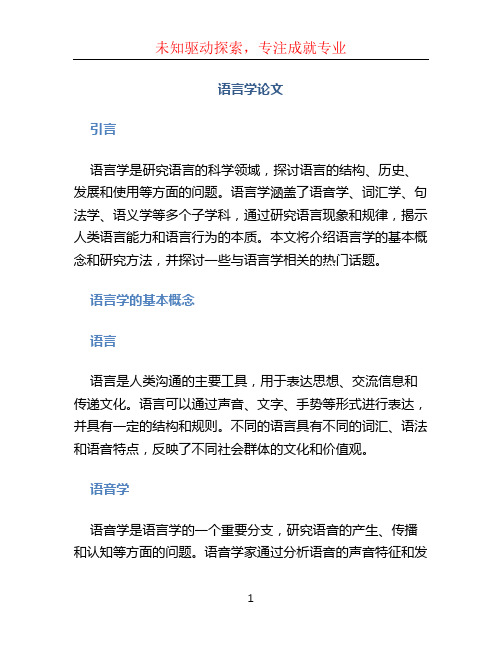
语言学论文引言语言学是研究语言的科学领域,探讨语言的结构、历史、发展和使用等方面的问题。
语言学涵盖了语音学、词汇学、句法学、语义学等多个子学科,通过研究语言现象和规律,揭示人类语言能力和语言行为的本质。
本文将介绍语言学的基本概念和研究方法,并探讨一些与语言学相关的热门话题。
语言学的基本概念语言语言是人类沟通的主要工具,用于表达思想、交流信息和传递文化。
语言可以通过声音、文字、手势等形式进行表达,并具有一定的结构和规则。
不同的语言具有不同的词汇、语法和语音特点,反映了不同社会群体的文化和价值观。
语音学语音学是语言学的一个重要分支,研究语音的产生、传播和认知等方面的问题。
语音学家通过分析语音的声音特征和发音方式,揭示语音的音位系统和音韵规律。
语音学对于理解语言的音素、音韵和音系等基本要素具有重要意义。
词汇学词汇学是研究词汇的学科,包括词汇的形态、词义、构词法和词汇变化等方面的内容。
词汇是语言的基本单位,通过词汇的组合和变化,人们可以构建不同的表达方式和意义。
词汇学的研究对于理解语言的语义结构和表达方式具有重要参考价值。
句法学句法学是研究句子的结构和语法规则的学科,包括句子成分、句子类型和句法关系等方面的内容。
句法学家通过分析句子的组织和成分之间的关系,揭示语言的语法结构和句法规则。
句法学的研究对于理解语言的句法结构和语法变化具有重要意义。
语义学语义学是研究语言的意义和人类思维的学科,涉及词义、句义和篇章意义等方面的内容。
语义学家通过分析词汇和句子的意义,探讨语言表达的逻辑关系和语义关联。
语义学对于理解语言的意义和语篇逻辑具有重要参考价值。
语言学的研究方法语言学的研究方法主要包括田野调查、统计分析和实验研究等。
以下将简要介绍这些研究方法:田野调查田野调查是语言学研究中常用的一种方法,通过对自然环境和语言使用情况的观察和记录,获取真实的语言数据。
研究人员可能会采访当地的居民,记录他们的口头语言和方言等。
英语语言学毕业论文(精选多篇)
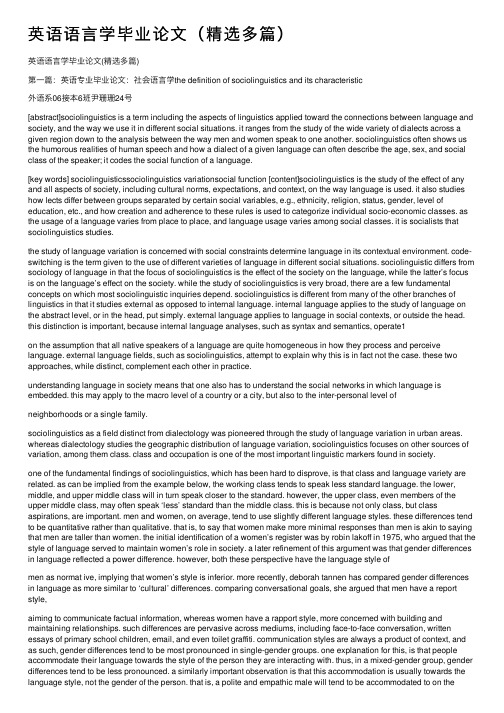
英语语⾔学毕业论⽂(精选多篇)英语语⾔学毕业论⽂(精选多篇)第⼀篇:英语专业毕业论⽂:社会语⾔学the definition of sociolinguistics and its characteristic外语系06接本6班尹珊珊24号[abstract]sociolinguistics is a term including the aspects of linguistics applied toward the connections between language and society, and the way we use it in different social situations. it ranges from the study of the wide variety of dialects across a given region down to the analysis between the way men and women speak to one another. sociolinguistics often shows us the humorous realities of human speech and how a dialect of a given language can often describe the age, sex, and social class of the speaker; it codes the social function of a language.[key words] sociolinguisticssociolinguistics variationsocial function [content]sociolinguistics is the study of the effect of any and all aspects of society, including cultural norms, expectations, and context, on the way language is used. it also studies how lects differ between groups separated by certain social variables, e.g., ethnicity, religion, status, gender, level of education, etc., and how creation and adherence to these rules is used to categorize individual socio-economic classes. as the usage of a language varies from place to place, and language usage varies among social classes. it is socialists that sociolinguistics studies.the study of language variation is concerned with social constraints determine language in its contextual environment. code-switching is the term given to the use of different varieties of language in different social situations. sociolinguistic differs from sociology of language in that the focus of sociolinguistics is the effect of the society on the language, while the latter’s focus is on the language’s effect on the society. while the study of sociolinguistics is very broad, there are a few fundamental concepts on which most sociolinguistic inquiries depend. sociolinguistics is different from many of the other branches of linguistics in that it studies external as opposed to internal language. internal language applies to the study of language on the abstract level, or in the head, put simply. external language applies to language in social contexts, or outside the head. this distinction is important, because internal language analyses, such as syntax and semantics, operate1on the assumption that all native speakers of a language are quite homogeneous in how they process and perceive language. external language fields, such as sociolinguistics, attempt to explain why this is in fact not the case. these two approaches, while distinct, complement each other in practice.understanding language in society means that one also has to understand the social networks in which language is embedded. this may apply to the macro level of a country or a city, but also to the inter-personal level ofneighborhoods or a single family.sociolinguistics as a field distinct from dialectology was pioneered through the study of language variation in urban areas. whereas dialectology studies the geographic distribution of language variation, sociolinguistics focuses on other sources of variation, among them class. class and occupation is one of the most important linguistic markers found in society.one of the fundamental findings of sociolinguistics, which has been hard to disprove, is that class and language variety are related. as can be implied from the example below, the working class tends to speak less standard language. the lower, middle, and upper middle class will in turn speak closer to the standard. however, the upper class, even members of the upper middle class, may often speak ‘less’ standard than the middle class. this is because not only class, but class aspirations, are important. men and women, on average, tend to use slightly different language styles. these differences tend to be quantitative rather than qualitative. that is, to say that women make more minimal responses than men is akin to saying that men are taller than women. the initial identification of a women’s register was by robin lakoff in 1975, who argued that the style of language served to maintain women’s role in society. a later refinement of this argument was that gender differences in language reflected a power difference. however, both these perspective have the language style ofmen as normat ive, implying that women’s style is inferior. more recently, deborah tannen has compared gender differences in language as more similar to ‘cultural’ differences. comparing conversational goals, she argued that men have a report style,aiming to communicate factual information, whereas women have a rapport style, more concerned with building and maintaining relationships. such differences are pervasive across mediums, including face-to-face conversation, written essays of primary school children, email, and even toilet graffiti. communication styles are always a product of context, and as such, gender differences tend to be most pronounced in single-gender groups. one explanation for this, is that people accommodate their language towards the style of the person they are interacting with. thus, in a mixed-gender group, gender differences tend to be less pronounced. a similarly important observation is that this accommodation is usually towards the language style, not the gender of the person. that is, a polite and empathic male will tend to be accommodated to on thebasis of their being polite and empathic, rather than their being male. sociolinguistics has drawn more and more attention since it became an independent discipline in mid 1960s. but scholars from various disciplines look at sociolinguistics from different perspectives, and carry out sociolinguistic study in different ways. this paper tries to understand sociolinguistics in terms of its definitions and the scope of sociolinguisticstudy to point o ut the lack of comprehensiveness in fishman’’s view on the definition of sociolinguistics.参考⽂献:《社会语⾔学概论》戴庆厦主编商务印书馆《社会语⾔学概论》祝畹瑾编著湖南教育出版社.《语⾔学概论》杨信彰⾼等教育出版社第⼆篇:英语语⾔学论⽂题⽬英语语⾔学论⽂题⽬13论国际商务谈判中的语⾔交际技巧33成⼈世界的童话——从⽂体学⾓度解析现今童话再度流⾏的现象49论⽂化差异与英汉商标互译55浅谈英汉句⼦结构差异59诗意的美和喜剧性幽默62试论⼴告英语的语⾔特点65统觉团对英语初学者词汇学习的影响67外语学习中应该重视中介语的作⽤69新闻报道中的转述动词研究73英汉禁忌语、委婉语的对⽐研究74英汉数字习语的对⽐研究76英译汉中词序的变动78英语⼴告的语⾔特征80英语双关语汉译的可译性限度101词义演变的原因与⽅式137从汉语中英语借词的翻译看⽂化交流138从价值观转换看斯佳丽的⾓⾊特征142从礼貌准则看中英⽂化的异同146从习语看英汉民族的⽂化差异149从英语⼈名中看性别歧视157动词过程类型的选择和话语隐性态度的表达161对母语在英语写作中词汇负迁移现象的思考162对严复译作中“信”的质疑167法律英语⽤词特征分析168法律语⾔翻译与法律⽂体177副词ever的句法环境和语义特征180功能语法视⾓下的英语报纸新闻标题的功能183⼴告⼝号语的语⾔特点189国际商务⽂化之对⽐研究204汉语中双关语的翻译213基于概念隐喻的诗歌解读228论⼴告英语中的幽默265论⼴告英语的语⾔特点268论汉英谚语的语⾔特征280论清教理念与美国西进运动282论莎⼠⽐亚⼗四⾏诗中的时间300论英语⼴告中⼏种常⽤修辞格及其汉译310论尤⾦?奥尼尔的表现主义⼿法324名词化的语篇功能330诺曼时期法语对英语词汇的影响339浅谈英语虚拟语⽓的语⽤功能340浅谈英语虚拟语⽓及其语⽤功能345浅析⼆⼗世纪计算机英语词汇的构成特点346浅析汉英动物谚语中的⽂化348浅析英汉语⾔中的性别歧视现象及其根源349浅析英语禁忌语及其发展352浅析英语⽆标志被动句356浅议译者能⼒359认知语⾔学⾓度下“within” 的空间隐喻意义365商标英语汉译的原则和⽅法384体育新闻英语⽂体研究375社会语⾔学视野中的⽹络语⾔418新闻英语中的语法特点研究423颜⾊词在英汉互译中的不对应性425移就的审美价值和⽣成基础426以认知为基础的颜⾊隐喻研究428隐喻认知功能研究的新视⾓429隐喻与⼀词多义的关系438英汉被动句对⽐研究439英汉宾语类型差异的认知原因。
关于语言学的论文

关于语言学的论文推荐文章关于美国文学的论文热度:关于美国文学的论文题目热度:关于华裔美国文学的论文热度:关于日本文学的论文热度:汉语言文学的毕业论文优秀例文热度:语言学(linguistics)是以人类语言为研究对象的学科,探索范围包括语言的性质、功能、结构、运用和历史发展,以及其他与语言有关的问题。
下文是店铺为大家整理的关于语言学的论文的范文,欢迎大家阅读参考!关于语言学的论文篇1浅析语言学的发展与趋势论文摘要:世界的全球化趋势决定了语言交际的重要性。
研究语言学对于外语教学,特别是以英语为目的语的外语教学就变得越来越重要。
本文立足于语言学的基础发展,着眼探讨其发展趋势,试图从其中把握其研究热点。
1 语言学的发展语言学的前身应该可以被既定为历史比较语言学(Historical comparative linguistics), 追溯更早则称之古代语文学阶段。
现代语言学是从索绪尔开始的,索绪尔开创了结构主义新时期,这一时期索绪尔(F.De.Saussure)著有《普通语言学教程》(The Course in General linguistic)。
结构主义中以美国结构主义影响最大,F.Boas, E.Sapir, L.Bloomfield 三者较为出名,他们创立了新结构主义学派——美国描述语言学,三者中以后者较为出名,所以美国语言学也叫“布龙非尔德主义”。
1.1 美国的结构主义美国结构主义的研究方法主要分为四种:替换分析法、对比分析法、分布分析法、直接成分分析法,其主要内容如下:(1)替换分析法(Substitutional Analysis),即用一个语言单位代换另一个语言单位是否得到新的事实。
(2)对比分析法(Contrastive Analysis)是比较两个或两个以上语言单位,找出他们相同或不同部分从而确定单位性质。
(3)分布分析法(Distribution Analysis)为研究词位出现的位置,词类(实、虚)分布的位置。
语言学毕业论文怎么写
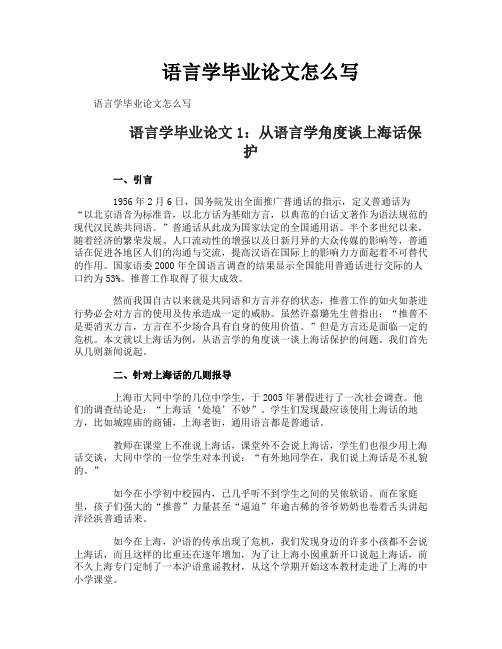
语言学毕业论文怎么写语言学毕业论文怎么写语言学毕业论文1:从语言学角度谈上海话保护一、引言1956年2月6日,国务院发出全面推广普通话的指示,定义普通话为“以北京语音为标准音,以北方话为基础方言,以典范的白话文著作为语法规范的现代汉民族共同语。
”普通话从此成为国家法定的全国通用语。
半个多世纪以来,随着经济的繁荣发展、人口流动性的增强以及日新月异的大众传媒的影响等,普通话在促进各地区人们的沟通与交流,提高汉语在国际上的影响力方面起着不可替代的作用。
国家语委2000年全国语言调查的结果显示全国能用普通话进行交际的人口约为53%。
推普工作取得了很大成效。
然而我国自古以来就是共同语和方言并存的状态,推普工作的如火如荼进行势必会对方言的使用及传承造成一定的威胁。
虽然许嘉璐先生曾指出:“推普不是要消灭方言,方言在不少场合具有自身的使用价值。
”但是方言还是面临一定的危机。
本文就以上海话为例,从语言学的角度谈一谈上海话保护的问题。
我们首先从几则新闻说起。
二、针对上海话的几则报导上海市大同中学的几位中学生,于2005年暑假进行了一次社会调查。
他们的调查结论是:“上海话‘处境’不妙”。
学生们发现最应该使用上海话的地方,比如城隍庙的商铺,上海老街,通用语言都是普通话。
教师在课堂上不准说上海话,课堂外不会说上海话,学生们也很少用上海话交谈,大同中学的一位学生对本刊说:“有外地同学在,我们说上海话是不礼貌的。
”如今在小学初中校园内,已几乎听不到学生之间的吴侬软语。
而在家庭里,孩子们强大的“推普”力量甚至“逼迫”年逾古稀的爷爷奶奶也卷着舌头讲起洋泾浜普通话来。
如今在上海,沪语的传承出现了危机,我们发现身边的许多小孩都不会说上海话,而且这样的比重还在逐年增加,为了让上海小囡重新开口说起上海话,前不久上海专门定制了一本沪语童谣教材,从这个学期开始这本教材走进了上海的中小学课堂。
“上海市语言文字工作要点”昨天发布,要点透露,今年本市将完成上海话有声数据库建设工作。
关于语言学发展历程论文

关于语言学发展历程论文语言是人类所特有的交流方式,对于语言的研究也经久不衰。
下文是店铺为大家整理的关于语言学发展历程论文的范文,欢迎大家阅读参考!关于语言学发展历程论文篇1语言学发展历程【摘要】语言是人类所特有的交流方式,对于语言的研究也经久不衰。
自从语言出现在地球上的那一刻起,就开始经历了数以千年的演变发展,并还会继续随着社会的变化而变化,一直不断地为人类交流而服务着。
【关键词】语言;发展;变化;社会自从人类出现在地球上,为了更好地生存发展,就有了交流的渴望。
而语言则是交流最有效的一种方式。
经过长期的发展,语言学也演变成一门博大精深的学科。
每门学科都有其特定的研究对象,顾名思义,语言学的研究对象就是人类的语言,其主要通过对语言现象的观察与分析,揭示出语言的规律。
一、语言的本质与功能从本质上说,语言是一种符号系统,从声音形式看,它有音素、音位等元素;从意义内容看,它有词义、句义及数、格等两大类元素。
除此之外,语言还是一种音义结合的体系。
语言作为一个整体,不仅包含了词汇,还包含了语法。
若从语言的本质来看,语言最突出的两个特点就是全民性与社会性。
语言的全民性体现在语言不是社会中某一个人创造出来的,它是所有社会成员创造的结果,而且语言也不是单单为某一个社会成员服务,它是为全体的社会成员服务的。
只是语言可以为不同的社会与不同的阶级所用,既可以从正面影响语言,也可能会让语言走向不同的发展道路。
语言的社会性体现在语言和社会的相互关系上。
语言是随着社会产生并随着社会发展的。
语言为社会服务,社会同时也促进语言的发展。
每一个社会都有其特定的语言,虽然在使用过程中,会出现变异,但是这些变异也是约定俗成,被全体社会所接受的。
而个人只有在社会中才会有语言,一个人学习与掌握的语言也跟他生活的社会息息相关。
类似狼孩的事例,是因为孩子从小生活在狼群里,而不是社会中,所以尽管是人类,但是他丧失了语言功能,只能发出类似狼的叫声用于交流。
毕业论文 语言学

毕业论文语言学语言学是一门研究语言的科学,它涉及到语言的起源、结构、演变以及人类对语言的认知和使用等方面。
在我即将毕业的这个时刻,回顾自己的大学学习生涯,我深刻地意识到语言学对于我们理解和掌握语言的重要性。
下面我将从语言的起源、语言的结构和语言的演变三个方面来谈谈我对语言学的理解和感悟。
首先,语言的起源一直是语言学家们关注的焦点之一。
在人类进化的过程中,语言的出现被认为是人类智力发展的重要标志之一。
语言的起源可以追溯到人类祖先的共同起源,而随着时间的推移,语言逐渐分化成不同的语系和语族。
语言学家通过对不同语言的比较研究,揭示了语言的起源和发展的规律。
对于我来说,了解语言的起源不仅帮助我更好地理解语言的本质,还让我对人类智慧的进化有了更深刻的认识。
其次,语言的结构是语言学的核心内容之一。
语言的结构包括语音、语法、词汇和语义等方面。
通过对语言的结构进行分析和研究,我们可以了解到不同语言之间的差异和共性。
在我的学习过程中,我曾经学习过一门外语,通过对比不同语言的语法结构和词汇用法,我发现不同语言之间的差异是如此之大,这让我对语言的多样性有了更深刻的认识。
同时,语言的结构也反映了人类对于世界的认知和理解方式,通过研究语言的结构,我们可以更好地理解人类思维的特点和规律。
最后,语言的演变是语言学研究的另一个重要方面。
语言是活的,它随着时间的推移不断变化和演变。
语言的演变可以通过对历史文献和语料库的研究来追踪和分析。
在我的学习过程中,我曾经研究过古代汉语和现代汉语的差异,通过对比两者的语法和词汇用法,我发现汉语在演变过程中经历了很多变化,这让我对语言的演变有了更深刻的认识。
同时,语言的演变也反映了社会、文化和历史的变迁,通过研究语言的演变,我们可以更好地了解人类社会的发展和变化。
总结起来,语言学作为一门研究语言的科学,对于我们理解和掌握语言具有重要的意义。
通过对语言的起源、语言的结构和语言的演变进行研究,我们可以更好地理解语言的本质和人类智慧的进化,同时也可以更好地了解语言的多样性和人类社会的发展。
语言学专业毕业论文 认知社会语言学的界定取向与外延
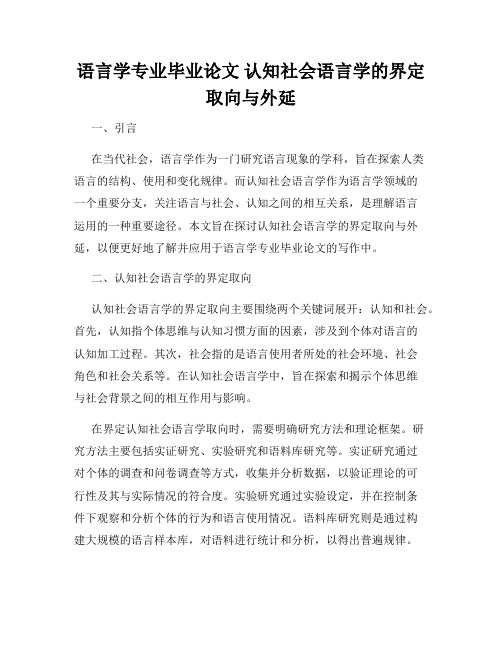
语言学专业毕业论文认知社会语言学的界定取向与外延一、引言在当代社会,语言学作为一门研究语言现象的学科,旨在探索人类语言的结构、使用和变化规律。
而认知社会语言学作为语言学领域的一个重要分支,关注语言与社会、认知之间的相互关系,是理解语言运用的一种重要途径。
本文旨在探讨认知社会语言学的界定取向与外延,以便更好地了解并应用于语言学专业毕业论文的写作中。
二、认知社会语言学的界定取向认知社会语言学的界定取向主要围绕两个关键词展开:认知和社会。
首先,认知指个体思维与认知习惯方面的因素,涉及到个体对语言的认知加工过程。
其次,社会指的是语言使用者所处的社会环境、社会角色和社会关系等。
在认知社会语言学中,旨在探索和揭示个体思维与社会背景之间的相互作用与影响。
在界定认知社会语言学取向时,需要明确研究方法和理论框架。
研究方法主要包括实证研究、实验研究和语料库研究等。
实证研究通过对个体的调查和问卷调查等方式,收集并分析数据,以验证理论的可行性及其与实际情况的符合度。
实验研究通过实验设定,并在控制条件下观察和分析个体的行为和语言使用情况。
语料库研究则是通过构建大规模的语言样本库,对语料进行统计和分析,以得出普遍规律。
理论框架方面,认知社会语言学借鉴了认知语言学和社会语言学的相关理论,力求在个体的认知机制与社会因素之间建立起联系。
在认知语言学方面,就有人们认为语言知识与人们的认知过程息息相关,无法割裂。
因此,认知社会语言学强调的是如何将个体的思维与社会语境相结合,以实现对语言使用的更全面的研究。
三、认知社会语言学的外延认知社会语言学的外延可以从多个角度进行解读和拓展。
首先,从认知角度来看,它不仅关注语言的认知加工过程,也关注语言与思维之间的相互关系。
例如,可以研究不同语境下的语言对个体思维的影响,以及语言如何塑造和影响个体的思维方式。
其次,从社会角度来看,认知社会语言学也可以研究不同社会背景下的语言使用规律和变化趋势。
例如,可以研究社会角色对语言使用的影响,探索不同社会群体之间的语言差异以及其背后的社会因素。
语言学类论文格式要求
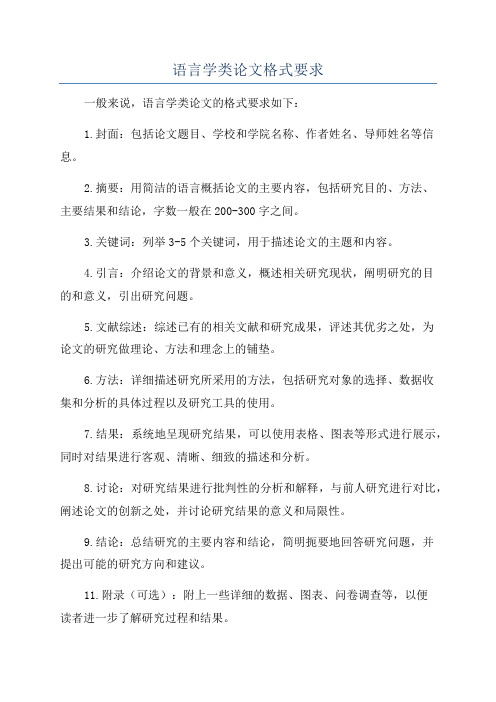
语言学类论文格式要求
一般来说,语言学类论文的格式要求如下:
1.封面:包括论文题目、学校和学院名称、作者姓名、导师姓名等信息。
2.摘要:用简洁的语言概括论文的主要内容,包括研究目的、方法、
主要结果和结论,字数一般在200-300字之间。
3.关键词:列举3-5个关键词,用于描述论文的主题和内容。
4.引言:介绍论文的背景和意义,概述相关研究现状,阐明研究的目
的和意义,引出研究问题。
5.文献综述:综述已有的相关文献和研究成果,评述其优劣之处,为
论文的研究做理论、方法和理念上的铺垫。
6.方法:详细描述研究所采用的方法,包括研究对象的选择、数据收
集和分析的具体过程以及研究工具的使用。
7.结果:系统地呈现研究结果,可以使用表格、图表等形式进行展示,同时对结果进行客观、清晰、细致的描述和分析。
8.讨论:对研究结果进行批判性的分析和解释,与前人研究进行对比,阐述论文的创新之处,并讨论研究结果的意义和局限性。
9.结论:总结研究的主要内容和结论,简明扼要地回答研究问题,并
提出可能的研究方向和建议。
11.附录(可选):附上一些详细的数据、图表、问卷调查等,以便
读者进一步了解研究过程和结果。
总体而言,论文格式要求清晰、规范、明确,尽量使用简明、客观、准确的语言进行表达,避免冗长和模糊的文字。
在论文写作过程中,应注重逻辑性、连贯性和条理性,确保论文内容的有机衔接和连贯性。
此外,还需要注意遵守学校的学术规范和论文撰写手册的要求。
语言学专业毕业论文 浅析索绪尔的语言学理论及其符号观
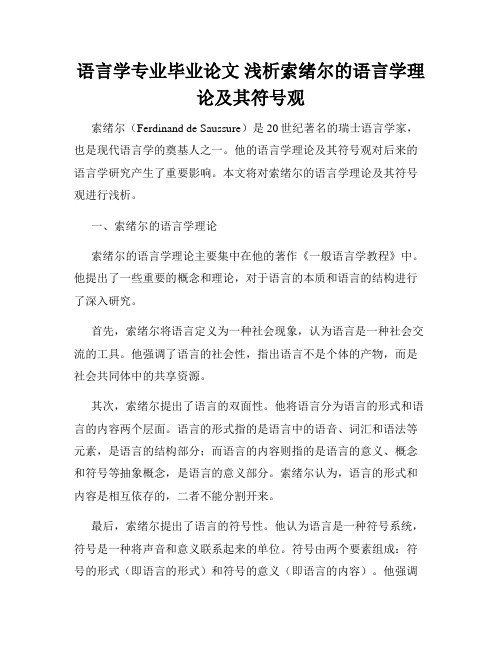
语言学专业毕业论文浅析索绪尔的语言学理论及其符号观索绪尔(Ferdinand de Saussure)是20世纪著名的瑞士语言学家,也是现代语言学的奠基人之一。
他的语言学理论及其符号观对后来的语言学研究产生了重要影响。
本文将对索绪尔的语言学理论及其符号观进行浅析。
一、索绪尔的语言学理论索绪尔的语言学理论主要集中在他的著作《一般语言学教程》中。
他提出了一些重要的概念和理论,对于语言的本质和语言的结构进行了深入研究。
首先,索绪尔将语言定义为一种社会现象,认为语言是一种社会交流的工具。
他强调了语言的社会性,指出语言不是个体的产物,而是社会共同体中的共享资源。
其次,索绪尔提出了语言的双面性。
他将语言分为语言的形式和语言的内容两个层面。
语言的形式指的是语言中的语音、词汇和语法等元素,是语言的结构部分;而语言的内容则指的是语言的意义、概念和符号等抽象概念,是语言的意义部分。
索绪尔认为,语言的形式和内容是相互依存的,二者不能分割开来。
最后,索绪尔提出了语言的符号性。
他认为语言是一种符号系统,符号是一种将声音和意义联系起来的单位。
符号由两个要素组成:符号的形式(即语言的形式)和符号的意义(即语言的内容)。
他强调了符号的任意性,指出符号与其所代表的意义之间并没有必然的联系,符号与意义之间的关系是社会约定的结果。
二、索绪尔的符号观索绪尔的符号观是他语言学理论的核心思想之一。
他认为符号是语言中最基本的单位,是语言交流的媒介。
符号通过特定的形式和特定的意义来传达信息。
符号观的重要性体现在索绪尔的语言学理论的多个方面。
首先,他认为符号是社会共享的,符号的意义是由社会共同体共同约定的。
这一观点对于语言学研究具有重要启示意义,因为它揭示了语言的社会性和文化背景的影响。
其次,索绪尔认为符号具有任意性。
符号与其所代表的意义之间没有必然的联系,符号的意义是通过社会约定来确定的。
这一观点挑战了传统的对符号与意义关系的理解,强调了符号的多义性和灵活性。
语言学专业毕业论文 应用语言学的研究现状与展望
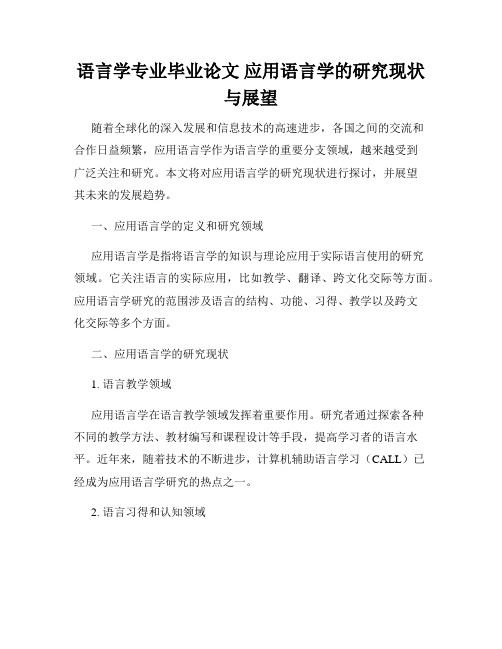
语言学专业毕业论文应用语言学的研究现状与展望随着全球化的深入发展和信息技术的高速进步,各国之间的交流和合作日益频繁,应用语言学作为语言学的重要分支领域,越来越受到广泛关注和研究。
本文将对应用语言学的研究现状进行探讨,并展望其未来的发展趋势。
一、应用语言学的定义和研究领域应用语言学是指将语言学的知识与理论应用于实际语言使用的研究领域。
它关注语言的实际应用,比如教学、翻译、跨文化交际等方面。
应用语言学研究的范围涉及语言的结构、功能、习得、教学以及跨文化交际等多个方面。
二、应用语言学的研究现状1. 语言教学领域应用语言学在语言教学领域发挥着重要作用。
研究者通过探索各种不同的教学方法、教材编写和课程设计等手段,提高学习者的语言水平。
近年来,随着技术的不断进步,计算机辅助语言学习(CALL)已经成为应用语言学研究的热点之一。
2. 语言习得和认知领域应用语言学对于语言习得和认知的研究也具有重要意义。
研究者通过探索语言习得过程中的认知机制、学习策略以及语言输入对习得的影响等问题,为语言教学、教材编写等提供理论依据。
3. 跨文化交际领域随着全球化的加深,跨文化交际成为应用语言学研究的另一个重要方向。
研究者通过分析不同文化背景下的语言差异和交际策略,帮助人们更好地进行跨文化交流和理解。
三、应用语言学的展望1. 多样化的语言教学方法未来,应用语言学将继续关注语言教学领域,努力推动语言教学方法的多样化发展。
通过整合新的技术手段和教学资源,例如虚拟现实、人工智能等,提升语言学习的效果。
2. 语言技术的发展随着信息技术的快速发展,自然语言处理技术成为应用语言学研究的新方向。
未来,语言技术将在机器翻译、语音识别、智能教育等领域发挥更大的作用。
3. 跨文化交际的研究随着全球化的深入发展,跨文化交际的需求越来越大。
未来,应用语言学将继续研究不同文化背景下的语言差异和交际策略,为人们提供更好的跨文化交际解决方案。
4. 可持续发展的教育模式未来,应用语言学将继续关注可持续发展的教育模式。
(语言学小论文)谈谈我身边的语言学现象
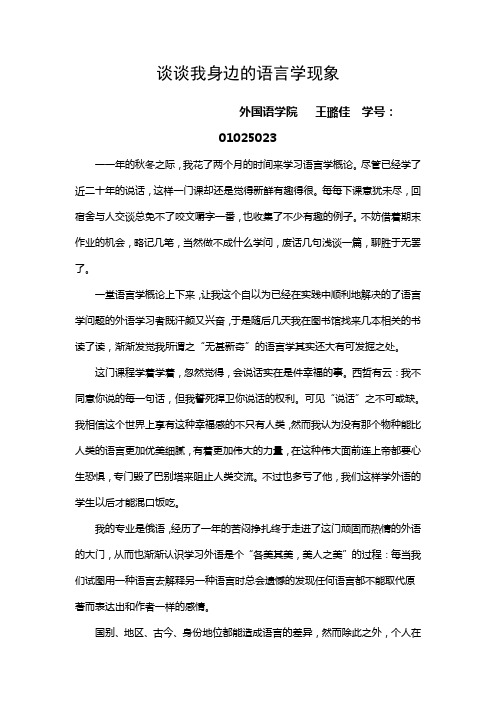
谈谈我身边的语言学现象外国语学院王璐佳学号:01025023 一一年的秋冬之际,我花了两个月的时间来学习语言学概论。
尽管已经学了近二十年的说话,这样一门课却还是觉得新鲜有趣得很。
每每下课意犹未尽,回宿舍与人交谈总免不了咬文嚼字一番,也收集了不少有趣的例子。
不妨借着期末作业的机会,略记几笔,当然做不成什么学问,废话几句浅谈一篇,聊胜于无罢了。
一堂语言学概论上下来,让我这个自以为已经在实践中顺利地解决的了语言学问题的外语学习者既汗颜又兴奋,于是随后几天我在图书馆找来几本相关的书读了读,渐渐发觉我所谓之“无甚新奇”的语言学其实还大有可发掘之处。
这门课程学着学着,忽然觉得,会说话实在是件幸福的事。
西哲有云:我不同意你说的每一句话,但我誓死捍卫你说话的权利。
可见“说话”之不可或缺。
我相信这个世界上享有这种幸福感的不只有人类,然而我认为没有那个物种能比人类的语言更加优美细腻,有着更加伟大的力量,在这种伟大面前连上帝都要心生恐惧,专门毁了巴别塔来阻止人类交流。
不过也多亏了他,我们这样学外语的学生以后才能混口饭吃。
我的专业是俄语,经历了一年的苦闷挣扎终于走进了这门顽固而热情的外语的大门,从而也渐渐认识学习外语是个“各美其美,美人之美”的过程:每当我们试图用一种语言去解释另一种语言时总会遗憾的发现任何语言都不能取代原著而表达出和作者一样的感情。
国别、地区、古今、身份地位都能造成语言的差异,然而除此之外,个人在语言方面的修养也起着重要作用。
伶牙俐齿者能自圆其说,铁齿铜牙者能嘻笑怒骂,笨嘴拙舌者则要遭抢白,正是这样的差别成就了不少文学作品中的经典。
譬如《红楼梦》中的晴雯一番冷嘲热讽竟就刺痛了一个家族一个时代。
每个人都有一套自己的哲学,同理也都有一套自己的语言学。
说话这件事,我们是要学一辈子的,不同的语言习惯就像一幅灵魂的肖像,展示着我们不同的性格,这在我们的生活中是随处可见的,下面我就略取几例来作证。
所谓贵人话语迟,在我们宿舍雪人(昵称)是一个典型的“贵人”。
语言学的毕业论文
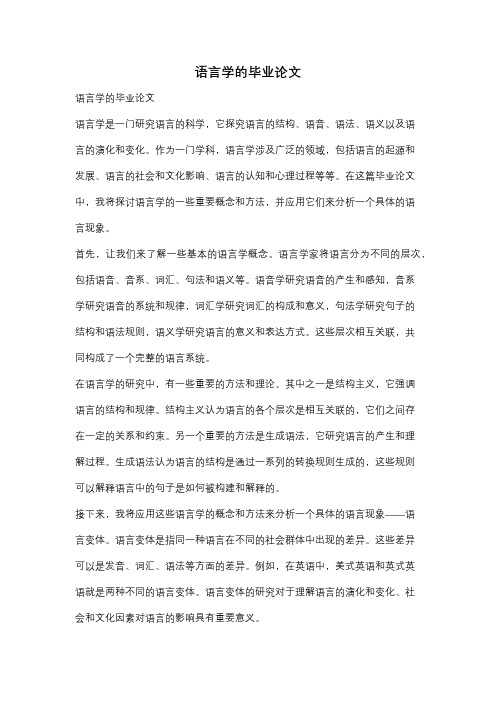
语言学的毕业论文语言学的毕业论文语言学是一门研究语言的科学,它探究语言的结构、语音、语法、语义以及语言的演化和变化。
作为一门学科,语言学涉及广泛的领域,包括语言的起源和发展、语言的社会和文化影响、语言的认知和心理过程等等。
在这篇毕业论文中,我将探讨语言学的一些重要概念和方法,并应用它们来分析一个具体的语言现象。
首先,让我们来了解一些基本的语言学概念。
语言学家将语言分为不同的层次,包括语音、音系、词汇、句法和语义等。
语音学研究语音的产生和感知,音系学研究语音的系统和规律,词汇学研究词汇的构成和意义,句法学研究句子的结构和语法规则,语义学研究语言的意义和表达方式。
这些层次相互关联,共同构成了一个完整的语言系统。
在语言学的研究中,有一些重要的方法和理论。
其中之一是结构主义,它强调语言的结构和规律。
结构主义认为语言的各个层次是相互关联的,它们之间存在一定的关系和约束。
另一个重要的方法是生成语法,它研究语言的产生和理解过程。
生成语法认为语言的结构是通过一系列的转换规则生成的,这些规则可以解释语言中的句子是如何被构建和解释的。
接下来,我将应用这些语言学的概念和方法来分析一个具体的语言现象——语言变体。
语言变体是指同一种语言在不同的社会群体中出现的差异。
这些差异可以是发音、词汇、语法等方面的差异。
例如,在英语中,美式英语和英式英语就是两种不同的语言变体。
语言变体的研究对于理解语言的演化和变化、社会和文化因素对语言的影响具有重要意义。
在研究语言变体时,我们可以使用一些特定的方法和工具。
其中之一是社会语言学调查,它通过调查问卷、访谈等方式收集语言使用者的数据。
这些数据可以用来分析不同社会群体之间的语言差异和变化。
另一个方法是语料库研究,它通过收集和分析大量的语言样本来揭示语言的规律和变化趋势。
这些方法和工具提供了一种系统和科学的方式来研究语言变体。
通过对语言变体的研究,我们可以了解语言的多样性和变化。
语言是人类的重要交流工具,它不仅仅是一种工具,更是一种文化和社会的表达。
有关语言学课程的论文范文
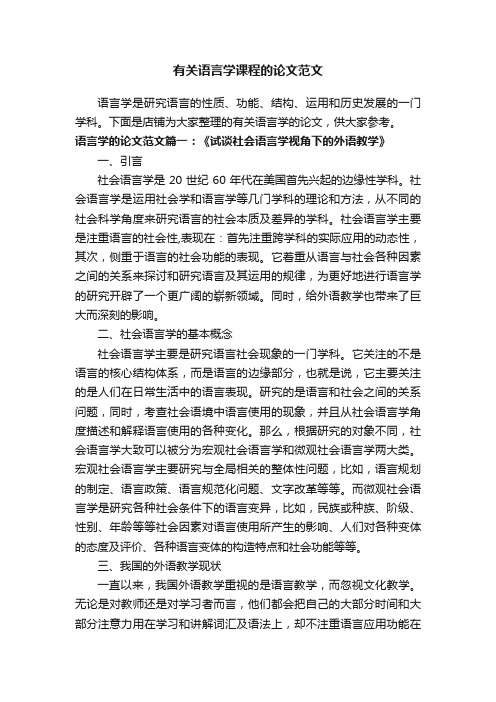
有关语言学课程的论文范文语言学是研究语言的性质、功能、结构、运用和历史发展的一门学科。
下面是店铺为大家整理的有关语言学的论文,供大家参考。
语言学的论文范文篇一:《试谈社会语言学视角下的外语教学》一、引言社会语言学是20世纪60年代在美国首先兴起的边缘性学科。
社会语言学是运用社会学和语言学等几门学科的理论和方法,从不同的社会科学角度来研究语言的社会本质及差异的学科。
社会语言学主要是注重语言的社会性,表现在:首先注重跨学科的实际应用的动态性,其次,侧重于语言的社会功能的表现。
它着重从语言与社会各种因素之间的关系来探讨和研究语言及其运用的规律,为更好地进行语言学的研究开辟了一个更广阔的崭新领域。
同时,给外语教学也带来了巨大而深刻的影响。
二、社会语言学的基本概念社会语言学主要是研究语言社会现象的一门学科。
它关注的不是语言的核心结构体系,而是语言的边缘部分,也就是说,它主要关注的是人们在日常生活中的语言表现。
研究的是语言和社会之间的关系问题,同时,考查社会语境中语言使用的现象,并且从社会语言学角度描述和解释语言使用的各种变化。
那么,根据研究的对象不同,社会语言学大致可以被分为宏观社会语言学和微观社会语言学两大类。
宏观社会语言学主要研究与全局相关的整体性问题,比如,语言规划的制定、语言政策、语言规范化问题、文字改革等等。
而微观社会语言学是研究各种社会条件下的语言变异,比如,民族或种族、阶级、性别、年龄等等社会因素对语言使用所产生的影响、人们对各种变体的态度及评价、各种语言变体的构造特点和社会功能等等。
三、我国的外语教学现状一直以来,我国外语教学重视的是语言教学,而忽视文化教学。
无论是对教师还是对学习者而言,他们都会把自己的大部分时间和大部分注意力用在学习和讲解词汇及语法上,却不注重语言应用功能在文化特征方面和社会实践方面的探究。
因此,使得学生对语言的运用能力整体都不合格,主要表现在不能用外语进行有效而流利的跨文化交际,不能将我国的传统文化真正传播出去。
语言学专业毕业论文 语言学家时枝诚记的语言过程理论研究
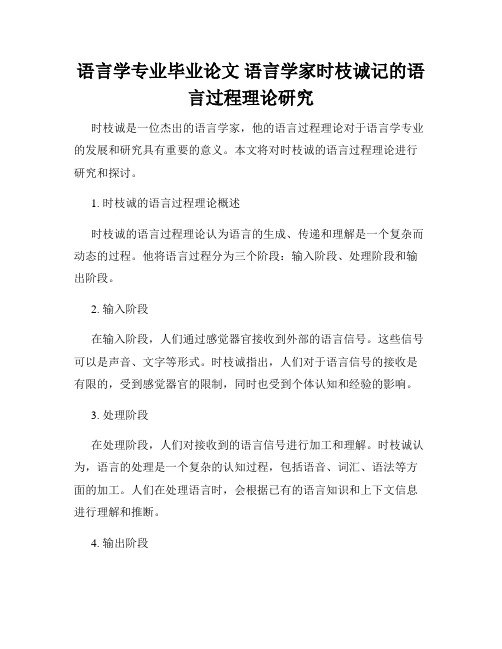
语言学专业毕业论文语言学家时枝诚记的语言过程理论研究时枝诚是一位杰出的语言学家,他的语言过程理论对于语言学专业的发展和研究具有重要的意义。
本文将对时枝诚的语言过程理论进行研究和探讨。
1. 时枝诚的语言过程理论概述时枝诚的语言过程理论认为语言的生成、传递和理解是一个复杂而动态的过程。
他将语言过程分为三个阶段:输入阶段、处理阶段和输出阶段。
2. 输入阶段在输入阶段,人们通过感觉器官接收到外部的语言信号。
这些信号可以是声音、文字等形式。
时枝诚指出,人们对于语言信号的接收是有限的,受到感觉器官的限制,同时也受到个体认知和经验的影响。
3. 处理阶段在处理阶段,人们对接收到的语言信号进行加工和理解。
时枝诚认为,语言的处理是一个复杂的认知过程,包括语音、词汇、语法等方面的加工。
人们在处理语言时,会根据已有的语言知识和上下文信息进行理解和推断。
4. 输出阶段在输出阶段,人们将经过加工和理解的语言信息再次转化为语言信号进行传递。
这个过程包括语音的表达、文字的书写等。
时枝诚认为,语言的输出不仅仅是简单的信号转换,还涉及到意义和目的的传递。
5. 语言过程的动态性时枝诚的语言过程理论强调了语言过程的动态性。
他认为,语言的生成、传递和理解是相互作用、相互影响的过程。
人们在语言交流中不断进行输入、处理和输出,这种动态性体现了语言的灵活性和变化性。
6. 语言过程的影响因素时枝诚的语言过程理论还关注了语言过程中的各种影响因素。
他认为,个体的认知能力、语言环境、社会文化等都会对语言过程产生影响。
时枝诚提出了语言过程的多层面分析模型,通过分析这些影响因素,可以更好地理解语言过程的复杂性。
7. 语言过程理论的应用时枝诚的语言过程理论在语言学研究中具有广泛的应用价值。
这一理论可以用于分析语音、语义、表达方式等方面的问题,并且可以为语言教育和语言技术的发展提供指导。
总结:时枝诚的语言过程理论对于语言学专业的发展和研究具有重要的意义。
他的理论从输入、处理和输出三个阶段的角度来分析语言过程,并强调了语言过程的动态性和影响因素。
- 1、下载文档前请自行甄别文档内容的完整性,平台不提供额外的编辑、内容补充、找答案等附加服务。
- 2、"仅部分预览"的文档,不可在线预览部分如存在完整性等问题,可反馈申请退款(可完整预览的文档不适用该条件!)。
- 3、如文档侵犯您的权益,请联系客服反馈,我们会尽快为您处理(人工客服工作时间:9:00-18:30)。
Linguistics英师123 胡聪12号Abstract: Linguistics studies not only particular language about English and Chinese, Arabic, Latin, but also it studies languages in general. It is a scientific study because it is based on the systematics investigation of linguistic data, conducted with reference to some general theory of language structure. Linguistics content of so many parts , and have an important influence to English study. Linguistics is the scientific study of language , language is system of arbitrary vocal symbols used for human communication.Key words: Linguistics, language, contents, influence.1.Introduction.Linguistics is generally defined as the scientific study of language. It tries to answer the basic questions. And it probes into various problems related to language. Linguistics also can have some important distinctions: prescriptive vs descriptive, synchronic vs diachronic, speech and writing, langue and parole, competence and performance, traditional grammar and modern linguistics. When we study linguistics ,we can explore the nature of human languages, and we can get close to the human nature. It is harmless to study linguistics.Linguistics takes an analytical approach to the study of language, and focus on developing skills in data analysis, problem solving, and logical thinking that can be .applied to many fields.2.The scope of linguisticsThe study of language as a whole is often called general linguistics. This deals with the basic concepts, theories, descriptions, models and methods applicable in any linguistic study, in contrast to those branches of study which relate linguistic to research of other areas. Language is a complicated entity with multiple layers and facets, so it is hardly possible for the linguists to deal with it all at once. Theyhave to concentrate on one aspect of it at a time. This has given rise to a number relatively independent branches within the area of linguistics. Linguistics content of phonetics, phonology, morphology, syntax, semantics, pragmatics, sociolinguistics, psycholinguistics and applied linguistics.Phonetics is the scientific study of speech sounds.It studies how speech sounds are articulated, transmitted, and received. It is a pure science and examines speech sounds in general.Phonology is the study of how speech sounds function in a language. It studies the ways speech sounds are organized. And it can be seen functional phonetics of particular language.Morphology is the study of the formation of words. It is a branch of linguistics which breaks words into morphemesSyntax deals with the combination of words into phrases, clauses and sentences. It is the grammar of sentence construction.Semantics is a branch of linguistics which is concerned with the study of meani ng in abstraction.Pragmatics can be defined as the study of language in use. It deals with how spe akers use language in ways which cannot be predicted from linguistic knowledge alone,and how hearers arrive at the intended meaning of speakers.In a broad sense pragmatics studies the principles observed by human beings when they communi cate with one another.Sociolinguistics is the studies of all these social aspects of language and its relation with society from the core of the branch.Psycholinguistics relates the study of language to psychology .It aims to answer such questions as how human mind works when we use language, how we as infants acquire our mother tongue, how we memorize ,and how we process the information we receive in the course of communication.Applied linguistics is the study of such applications. But in a narrow sense applied linguistics refer to the application of linguistic theories and principles to language teaching, especially the teaching of foreign and second languages.3.The change of linguisticsWith time goes by, the linguistics can change a lot. Phonological changes can contents of two major types: sequential change and segmental change.Morphological and syntactic can also have change. It can have the addition of affixes, loss of affixes, the change of word order and the change in negation rule.Lexical and semantic change can be seen in the addition of new words like coinage, clipped words, blending acronyms ,back-formation, functional shift and borrowing, then loss of words semantic changes. All the change can have influence of moving towards greater informality ,and American English, then science and technology. The cause of those change are “the theory of least effort”and “economy of memory”.4.ConclusionLinguistics is the scientific study of language. Language is not only express facts, ideas, or events which represent similar world knowledge by its people, but also reflects the people’s attitude, beliefs, points of views and ways of life. In a word ,language express cultural reality. Linguistic can have close relationship with English study and society. It can bring the way to study a language. It is also related with lexicology. So it is important to learn linguistics well. We should pay more attention to the study of linguistics.。
